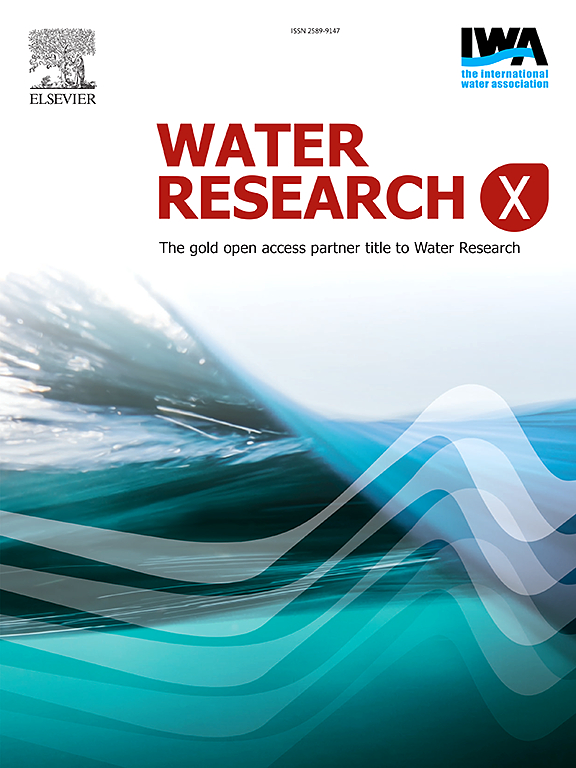利用基于lstm的神经进化来增强城市排水系统的实时控制
IF 8.2
2区 环境科学与生态学
Q1 ENGINEERING, ENVIRONMENTAL
引用次数: 0
摘要
城市排水系统的实时控制(RTC)有助于减少洪水和下水道溢流(CSO)溢出,从而减轻气候变化和城市化的压力。近年来,基于神经网络的控制策略制定方法(如深度强化学习和神经进化)在RTC中显示出前景。以往的研究主要集中在从状态变量的选择、奖励函数的制定和控制频率的调整等方面来改进这些方法的性能。然而,神经网络架构的影响仍未得到充分探索。本研究探讨了长短期记忆(LSTM)作为城市排水系统RTC神经进化中的政策网络的表现。来自Astlingen基准网络的仿真结果表明,与被动控制相比,基于lstm的策略减少了9.8% - 10.1%的CSO量,优于基于多层感知器的策略,后者在2000-2009年间减少了7.0% - 9.0%。对于基于lstm的策略,内存信息对决策有积极作用,而零初始化内存导致CSO体积增加10.0% - 21.0%,反映出控制恶化。此外,使用单个油箱液位作为输入的基于lstm的策略在RTC中提供了一种有效的替代方案,比基于等填充度的全局控制策略在BC上取得了更大的改进。这些改进也超过了使用多变量输入和单变量输入的基于lstm的策略所取得的效果。这项研究揭示了基于lstm的神经进化在城市排水系统RTC中的潜力,支持水基础设施的智能管理。本文章由计算机程序翻译,如有差异,请以英文原文为准。

Leveraging LSTM-based neuro-evolution for enhanced real-time control in urban drainage systems
Real-time control (RTC) of urban drainage systems helps reduce flooding and combined sewer overflow (CSO) spills, thereby alleviating the pressures of climate change and urbanization. In recent years, neural network-based methods for control policy formulation—such as deep reinforcement learning and neuro-evolution—have shown promise in RTC. Previous studies have focused on improving the performance of these methods by exploring aspects such as state variable selection, reward function formulation, and control frequency adjustment. However, the impact of neural network architecture remains underexplored. This study investigates the performance of Long Short-Term Memory (LSTM) as a policy network in neuro-evolution for RTC of urban drainage systems. The simulation results from the Astlingen benchmarking network show that LSTM-based policies reduce CSO volume by 9.8 %–10.1 % compared to passive control, outperforming Multi-Layer Perceptron-based policies, which achieve reductions of 7.0 %–9.0 % during 2000–2009. For LSTM-based policies, memory information contributes positively to decision-making, while zero-initialized memory leads to a 10.0 %–21.0 % increase in CSO volume, reflecting deteriorating control. Additionally, LSTM-based policies using a single tank level as input offer an efficient alternative in RTC, achieving greater improvements over BC than the global control strategy based on equal filling degree. These improvements also surpass those achieved by LSTM-based policies using multivariate input versus single-variable input. This study reveals the potential of LSTM-based neuro-evolution in RTC of urban drainage systems, supporting the intelligent management of water infrastructure.
求助全文
通过发布文献求助,成功后即可免费获取论文全文。
去求助
来源期刊

Water Research X
Environmental Science-Water Science and Technology
CiteScore
12.30
自引率
1.30%
发文量
19
期刊介绍:
Water Research X is a sister journal of Water Research, which follows a Gold Open Access model. It focuses on publishing concise, letter-style research papers, visionary perspectives and editorials, as well as mini-reviews on emerging topics. The Journal invites contributions from researchers worldwide on various aspects of the science and technology related to the human impact on the water cycle, water quality, and its global management.
 求助内容:
求助内容: 应助结果提醒方式:
应助结果提醒方式:


